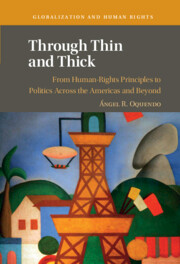Book contents
- Through Thin and Thick
- Globalization and Human Rights
- Through Thin and Thick
- Copyright page
- Contents
- Introduction
- Part I Conception
- Part II Concretion
- Part III Confliction
- Part IV Connection
- 24 Overview
- 25 Positivity
- 26 Procedure
- 27 Protection
- 28 Security
- 29 Aggregation
- 30 Collectivization
- 31 Internationalization
- Conclusion
- Index
- Books in the Series
30 - Collectivization
from Part IV - Connection
Published online by Cambridge University Press: 18 June 2022
- Through Thin and Thick
- Globalization and Human Rights
- Through Thin and Thick
- Copyright page
- Contents
- Introduction
- Part I Conception
- Part II Concretion
- Part III Confliction
- Part IV Connection
- 24 Overview
- 25 Positivity
- 26 Procedure
- 27 Protection
- 28 Security
- 29 Aggregation
- 30 Collectivization
- 31 Internationalization
- Conclusion
- Index
- Books in the Series
Summary
So-called diffuse-rights actions, which resemble those under civilly procedural Rule 23(b)(2) or citizen suits in the United States, seem to have developed dramatically in Latin America over the last three decades. They usually entitle anyone to represent the polis as a whole or a specific subgroup, without forcing her to attest an individualized injury. She may press for equitable or often reparative relief to substantiate societal safeguards, like those in favor of the ecology or precious monuments. The almost universally exercisable unconstitutionality-complaint provides a special case in point. Apparently unprecedented north of the border and having outdistanced its forebears on the European Continent, it alternatively empowers her to actualize the polity’s commitment to legislators’ or administrators’ adherence to constitutionalized constraints. She may have unconstitutional norms invalidated as such before their application. Independently of the entitlement effectuated or the remedy requested across the board, the dispositional outcome normally hinders everyone else from attempting anew. Essentially, it extinguishes her priorly available license to litigate.
- Type
- Chapter
- Information
- Through Thin and Thick , pp. 307 - 318Publisher: Cambridge University PressPrint publication year: 2022

